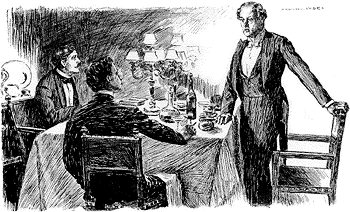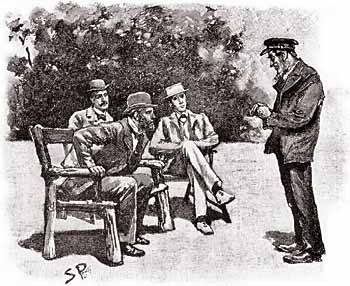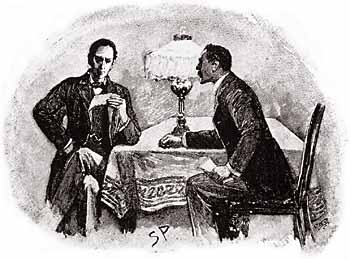“You never heard me talk of Victor Trevor? He was the only friend I made during the two years I was at college. I was never a very sociable fellow, Watson, always rather fond of moping in my rooms and working out my own little methods of thought, so that I never mixed much with the men of my year. Bar fencing and boxing I had few athletic tastes, and then my line of study was quite distinct from that of the other fellows, so that we had no points of contact at all. Trevor was the only man I knew, and that only through the accident of his bull terrier freezing on to my ankle one morning as I went down to chapel. It was a prosaic way of forming a friendship, but it was effective.” (“The ‘Gloria Scott’”)
In “The Five Orange Pips,” Dr. Watson inquires as to who could be calling at Baker Street on such an inclement evening. He suggests that their late-night visitor might be a friend of the Great Detective, who dismisses the possibility immediately: “Except yourself I have none… I do not encourage visitors.” It is not until Sherlock Holmes shares the story of “The ‘Gloria Scott’,” that the reader learns that this declaration is not precisely true. In GLOR, found in The Memoirs of Sherlock Holmes, Holmes reveals the existence of Victor Trevor, one of only three people in the canon that the Detective explicitly refers to as his friend (Klinger, The New Annotated Sherlock Holmes, 501). The two others are Dr. Watson, naturally, and perhaps more surprisingly – Inspector Lestrade, whom Holmes amiably refers to periodically throughout the canon as “friend Lestrade” (NOBL, CARD, EMPT, NORW, 3GAR).
In “The Five Orange Pips,” Dr. Watson inquires as to who could be calling at Baker Street on such an inclement evening. He suggests that their late-night visitor might be a friend of the Great Detective, who dismisses the possibility immediately: “Except yourself I have none… I do not encourage visitors.” It is not until Sherlock Holmes shares the story of “The ‘Gloria Scott’,” that the reader learns that this declaration is not precisely true. In GLOR, found in The Memoirs of Sherlock Holmes, Holmes reveals the existence of Victor Trevor, one of only three people in the canon that the Detective explicitly refers to as his friend (Klinger, The New Annotated Sherlock Holmes, 501). The two others are Dr. Watson, naturally, and perhaps more surprisingly – Inspector Lestrade, whom Holmes amiably refers to periodically throughout the canon as “friend Lestrade” (NOBL, CARD, EMPT, NORW, 3GAR).
The existence of Victor Trevor lends weight to Sherlock Holmes’s existence, gives shape to the person that Holmes was before he ever arrived at Baker Street. It sometimes seems that Dr. Watson’s stories tell the reader so little about the Great Detective’s early life that it is easy to imagine that the man simply sprang into existence, fully formed like Athena from Zeus’s forehead, and was waiting for Watson to appear in that laboratory in St. Bart’s. But the presence of a character like Victor Trevor reminds the reader that there was a Sherlock Holmes before there ever was a Dr. Watson, that he had an early life and a history that remain tantalizingly just out of our grasp. Furthermore, the existence of Victor Trevor demonstrates that there was once a time when the Great Detective was not as the reader knows him, that there was a time when he barely existed at all.
As Sherlock Holmes points out, his first meeting with Victor Trevor was rather inauspicious, and in fact, Holmes’s encounter with Trevor’s dog left him incapacitated for ten days, which indicates a somewhat serious injury. It’s a wonder that Holmes – a man who loathed extended periods of inactivity – would even tolerate Trevor’s presence afterwards. However, there is something about Victor Trevor to which Holmes responds: “He was a hearty, full-blooded fellow, full of spirits and energy, the very opposite to me in most respects, but we had some subjects in common, and it was a bond of union when I found that he was as friendless as I.”
It wouldn’t be too much of a stretch to say that there is a bit of Victor Trevor in Dr. Watson. Upon returning from Afghanistan, Dr. Watson was still ill, and could not honestly be classified as either “hearty” or “full-blooded,” but Holmes immediately identifies him as a soldier and so has the potential to be both those things again. Furthermore, as a medical man, Watson would have likely shared at least some of Holmes’s love of chemistry (even before the two ever shared a love of adventure), which the Doctor demonstrates in the way he avidly observes his friend’s chemical experiments: “His hands were invariably blotted with ink and stained with chemicals, yet he was possessed of extraordinary delicacy of touch, as I frequently had occasion to observe when I watched him manipulating his fragile philosophical instruments” (STUD). Finally, Dr. Watson, like Victor Trevor before him, was entirely alone: “I had neither kith nor kin in England, and was therefore as free as air – or as free as an income of eleven shillings and sixpence a day will permit a man to be” (STUD).
It wouldn’t be too much of a stretch to say that there is a bit of Victor Trevor in Dr. Watson. Upon returning from Afghanistan, Dr. Watson was still ill, and could not honestly be classified as either “hearty” or “full-blooded,” but Holmes immediately identifies him as a soldier and so has the potential to be both those things again. Furthermore, as a medical man, Watson would have likely shared at least some of Holmes’s love of chemistry (even before the two ever shared a love of adventure), which the Doctor demonstrates in the way he avidly observes his friend’s chemical experiments: “His hands were invariably blotted with ink and stained with chemicals, yet he was possessed of extraordinary delicacy of touch, as I frequently had occasion to observe when I watched him manipulating his fragile philosophical instruments” (STUD). Finally, Dr. Watson, like Victor Trevor before him, was entirely alone: “I had neither kith nor kin in England, and was therefore as free as air – or as free as an income of eleven shillings and sixpence a day will permit a man to be” (STUD).
In fact, to take the analysis a step farther, the same characteristics could even be said to be true of Inspector Lestrade – Holmes’s other canonical friend. As a policeman, Lestrade would most likely have been “hearty” and “full-blooded,” and he certainly demonstrates these features as he chases after Holmes on many an occasion. The Detective and Lestrade certainly do not share many common interests, but they most certainly share a love of interesting crime, a desire to see mysteries solved, and justice brought to the guilty parties. As for being isolated and friendless, not much is known about Inspector Lestrade’s personal life (the reader cannot even be sure of his first name), and due to the competitive natures of his colleagues at Scotland Yard, it might be fair to say that Lestrade found few allies amongst his professional associates.
Amongst his other contributions, Victor Trevor is most famously responsible for setting Sherlock Holmes on the path to becoming the Great Detective. Trevor invites Holmes to spend a month’s holiday with himself and his father at their home in Donnithorpe, where the young Trevor explains to his father about his new friend’s powers of observation. The elder Trevor asks Holmes for a demonstration, and is totally unsettled by the result: “I don’t know how you manage this, Mr. Holmes, but it seems to me that all the detectives of fact and of fancy would be children in your hands. That’s your line of life, sir, and you may take the word of a man who has seen something of the world.”
Amongst his other contributions, Victor Trevor is most famously responsible for setting Sherlock Holmes on the path to becoming the Great Detective. Trevor invites Holmes to spend a month’s holiday with himself and his father at their home in Donnithorpe, where the young Trevor explains to his father about his new friend’s powers of observation. The elder Trevor asks Holmes for a demonstration, and is totally unsettled by the result: “I don’t know how you manage this, Mr. Holmes, but it seems to me that all the detectives of fact and of fancy would be children in your hands. That’s your line of life, sir, and you may take the word of a man who has seen something of the world.”
In A Study in Scarlet, Holmes informs Watson that he is the world’s only unofficial consulting detective, and that he has created his own profession. But the idea for that profession must have stemmed from somewhere, someone must have planted the seed, and it appears that the readers can thank Victor Trevor for that. It is not to say that Sherlock Holmes would not have found his way to his chosen vocation without Victor Trevor, but some gratitude must be extended to Victor Trevor and his father, for who knows how long we would have had to wait had it not been for their suggestion. As Holmes tells Watson, “And that recommendation, with the exaggerated estimate of my ability with which he prefaced it, was, if you will believe me, Watson, the very first thing which ever made me feel that a profession might be made out of what had up to that time been the merest hobby.”
Victor Trevor never really recovers from the tragedy that befell his father, and at the end of GLOR, the reader learns that Trevor is working a tea plantation in India. Holmes says that he thinks that he is doing well, but it appears that he has lost track of his old friend. Trevor occasionally makes appearances in various pastiches, recently turning up in the graphic novel, Sherlock Holmes: Year One, where the young Holmes is on a desperate errand to prevent his friend from self-destructing – amongst other plot points. While the canonical Victor Trevor only appears in the one story, he provides a blueprint for Dr. Watson, and perhaps, in a way, for Inspector Lestrade. By showing Sherlock Holmes the type of man that the Detective could relate to, he prevented Holmes from being entirely alone. It might be going too far to say that without Victor Trevor there would have been no Dr. Watson, but he certainly laid the path, and provided precedent and context, for a solitary man to have need of a companion, after all.
Victor Trevor never really recovers from the tragedy that befell his father, and at the end of GLOR, the reader learns that Trevor is working a tea plantation in India. Holmes says that he thinks that he is doing well, but it appears that he has lost track of his old friend. Trevor occasionally makes appearances in various pastiches, recently turning up in the graphic novel, Sherlock Holmes: Year One, where the young Holmes is on a desperate errand to prevent his friend from self-destructing – amongst other plot points. While the canonical Victor Trevor only appears in the one story, he provides a blueprint for Dr. Watson, and perhaps, in a way, for Inspector Lestrade. By showing Sherlock Holmes the type of man that the Detective could relate to, he prevented Holmes from being entirely alone. It might be going too far to say that without Victor Trevor there would have been no Dr. Watson, but he certainly laid the path, and provided precedent and context, for a solitary man to have need of a companion, after all.
oOo
“Better Holmes & Gardens” now has its own Facebook page. Join by “Liking” the page here, and receive all the latest updates, news, and Sherlockian tidbits.




Your post highlights once again that friendship in all its variety emerges as one of the most important themes of the Holmes canon. I truly admire the way you bring out how each relationship Holmes has or reports in the stories reveals another little bit of his very rounded personality. He can never be reduced to a series of traits since he lives and moves in these interesting relationships with other characters.
ReplyDelete@Lucy: Thank you for your kind comment! I think I'm fixated on the idea that Sherlock Holmes did not and could not exist in a vacuum, even though so many have already said so before me, and said it so much better! I think it's interesting that the one character who would end up defining so much of Holmes's personality--Dr. Watson--once tried to define him by a very narrow list of traits! :-)
ReplyDeleteSo good to find perceptive, valuable analyses like this via Twitter. Rightly, you stress the importance of friendship to our sense of Holmes's humanity and mortality. He quotes Baxter rather than John Donne's "No man is an island.." but means the same: "I never hear of such a case as this that I do not think of Baxter's words, and say, "There, but for the grace of God goes Sherlock Holmes." (Boscombe Valley Mystery)
ReplyDelete